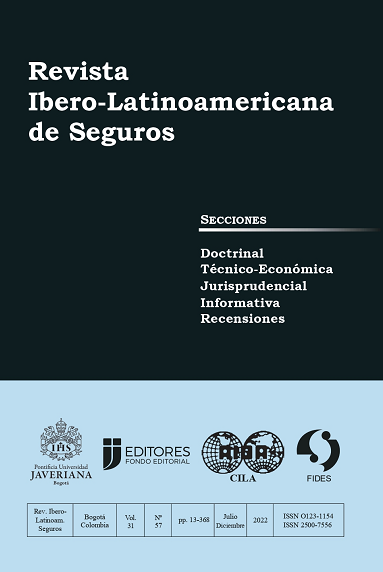Abstract
The institute of concealment (or misrepresentation) is analyzed from the point of view of the Argentine legal regime, making a comparison with the Uruguayan and Chilean systems, since they have received modifications in the last 10 years. The Uruguayan regime is the most severe of all for the insured. In Argentina, in the case of faulty concealment, the effect caused by the false or inaccurate risk statement is, in principle, the relative nullity of the contract, unless the insurer opts for readjustment. On the other hand, in life insurance, if certain conditions are met, this readjustment can be imposed on the insurer. In Chile, on the contrary, the effect in all insurance classes -with the exception of marine insurance- can be both the rescission of the contract and its readjustment. As a differential nuance, both in Argentina and Uruguay, and as a kind of counterweight in favor for the insured, the need for the insurer to produce an expert report is established, aimed to accrediting the requirement of the transcendence or relevance of the omitted or falsified circumstance. Finally, in all the legal regimes analyzed, in the event of fraudulent concealment, the effect is always and in all insurance classes, the relative nullity of the contract.
- Donati, Antígono (1952). Trattato del diritto delle assicurazioni private, Editorial Giuffrè.
- Estebenet, Carlos A. (2010). El tema de la reticencia en los fallos: una cuestión recurrente, Revista El Derecho, Nº 12.595, Año XLVIII.
- Gamboa, Graciela B. (2004). Seguro de vida. El deber de información. Prueba de peritos, Revista La Ley Cuyo, pág. 1121.
- Ghersi, Carlos (2007). Contrato de Seguro, Editorial Astrea, Buenos Aires.
- Halperin, Isaac (1970). “Seguros – Exposición crítica de la ley 17.418”, Editorial Depalma, 1era. edición, Buenos Aires.
- Halperin, Isaac (2001). “Seguros -Exposición crítica de las leyes 17.418, 20.091 y 22.400-”, Editorial Depalma, 3era. edición actualizada y ampliada por Nicolás H. Barbato, Buenos Aires.
- Meilij, Gustavo R. - Barbato, Nicolás H. (1975). Tratado de Derecho de Seguros, Editorial Zeus, Rosario.
- Morandi, Juan C. F. (1971). Estudios de derecho de seguros, Editorial Pannedille, Buenos Aires.
- López Saavedra, Domingo M. (2012). Ley de Seguros Comentada, Editorial La Ley, 2da. edición, Buenos Aires.
- Perucchi Héctor – Perucchi Juan Ignacio (2015). Código - Seguro, Editorial Infojus, 1era. edición, Buenos Aires.
- Schiavo, Carlos (2006). Contrato de Seguro - Reticencia y agravación del riesgo, Editorial Hammurabi, Buenos Aires.
- Schwarzberg, Carlos (2009). La reticencia y su prueba, Revista El Derecho, Nº 12.410, Año XLVII.
- Soto, Héctor M. - Vila, Nancy A. - Contarino, Felisa L. - Cracogna, Fernando - Magula, Martín - Cerejido, Pablo - Pereyra, Rita T. (2003). La reticencia y la falsa declaración en el contrato de seguro, Revista La Ley, Tomo 2003-B, pág. 1434.
- Stiglitz, Rubén S. (2016). Derecho de Seguros, Editorial La Ley, 6ta. edición, Buenos Aires.
This journal is registered under a Creative Commons Attribution 4.0 International Public License. Thus, this work may be reproduced, distributed, and publicly shared in digital format, as long as the names of the authors and Pontificia Universidad Javeriana are acknowledged. Others are allowed to quote, adapt, transform, auto-archive, republish, and create based on this material, for any purpose (even commercial ones), provided the authorship is duly acknowledged, a link to the original work is provided, and it is specified if changes have been made. Pontificia Universidad Javeriana does not hold the rights of published works and the authors are solely responsible for the contents of their works; they keep the moral, intellectual, privacy, and publicity rights.
Approving the intervention of the work (review, copy-editing, translation, layout) and the following outreach, are granted through an use license and not through an assignment of rights. This means the journal and Pontificia Universidad Javeriana cannot be held responsible for any ethical malpractice by the authors. As a consequence of the protection granted by the use license, the journal is not required to publish recantations or modify information already published, unless the errata stems from the editorial management process. Publishing contents in this journal does not generate royalties for contributors.


